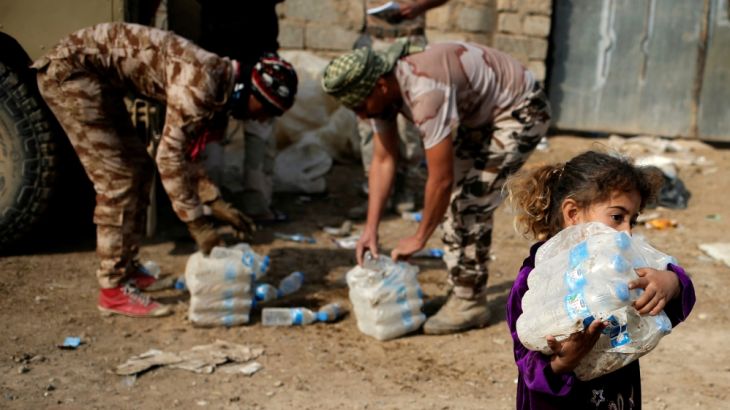Mosul: Thousands facing ‘catastrophic’ water shortages
Some Iraqi civilians forced to drink sewage water after major water pipeline was destroyed during fighting with ISIL.

A growing water crisis in Iraq’s Mosul is affecting up to 650,000 civilians in the city.
It is also preventing thousands of displaced families from returning to their homes and hampering efforts to completely clear the city of ISIL fighters.
Keep reading
list of 4 itemsRussia-Ukraine war: List of key events, day 792
US secretly sent long-range ATACMS weapons to Ukraine
Russia-Ukraine war: List of key events, day 791
“Even in areas retaken by Iraqi forces there is no water,” Al Jazeera’s Imran Khan reported from east of Mosul.
“Without running water, areas near here that have been cleared of ISIL fighters still remain uninhabitable.”
READ MORE: Water supply cut off for half of Mosul
Earlier this week, water was cut for 40 percent of Mosul residents when a major pipeline was hit during fighting between ISIL and the Iraqi government forces trying to crush the group.
The UN children’s agency UNICEF said the break was located in an inaccessible part of the city controlled by ISIL.
|
|
“Unless running water is restored in the next days, civilians will be forced to resort to unsafe water sources, exposing children to the risk of waterborne diseases such as severe diarrhoea and the threat of malnutrition,” it added.
Stuck in camps, or worse
The water shortage has forced thousands of displaced Iraqis, who should have returned home after their towns and villages were retaken by Iraqi forces, to remain in camps.
But with limited space available in the already overcrowded camps, many families have to stay in Mosul’s uninhabitable outskirts, without clean drinking water.
“Desperation has forced some to use sewage water,” said Al Jazeera’s Khan.
“The government and the aid agencies are sending in tankers of water as a temporary measure but it’s not enough. Hundreds, who cannot stay in Mosul but don’t have any place to stay in the camps either, queue for water every day.”
READ MORE: Battle for Mosul – ISIL’s innocent victims
The battle for Mosul has already raged for six weeks. Iraqi commanders say around 40 percent of the eastern half of Mosul has been retaken from ISIL since the huge offensive began on October 17.
The forces have told civilians to stay at home to avoid massive displacement from the city, which was believed to have a population of a million-plus before the operation started.
Aid workers say a full siege is developing and fear that the longer the conflict drags on, the more civilians will suffer.
